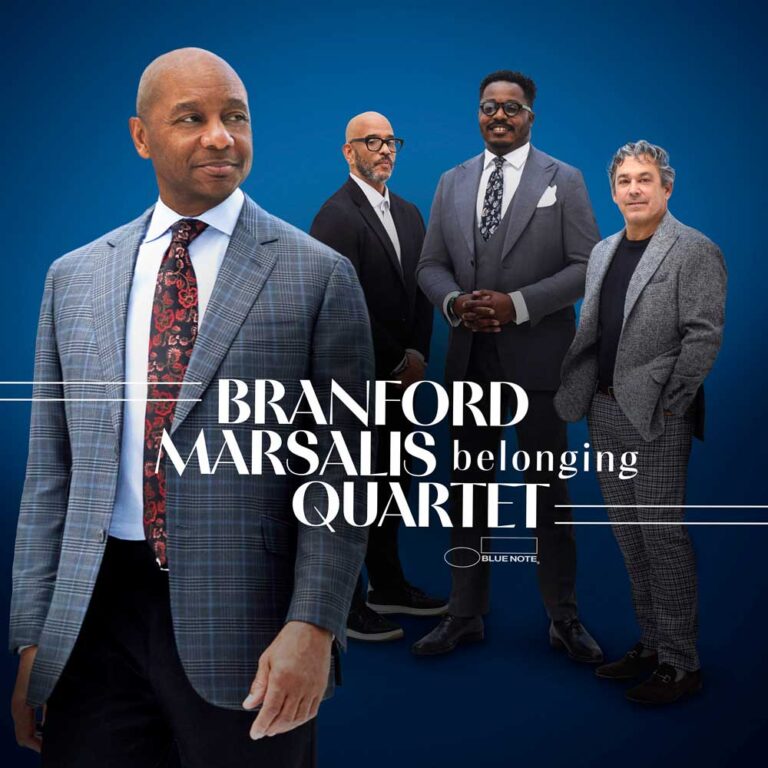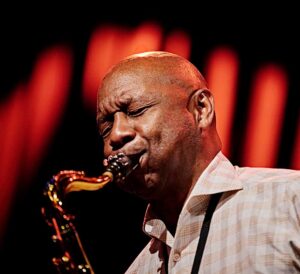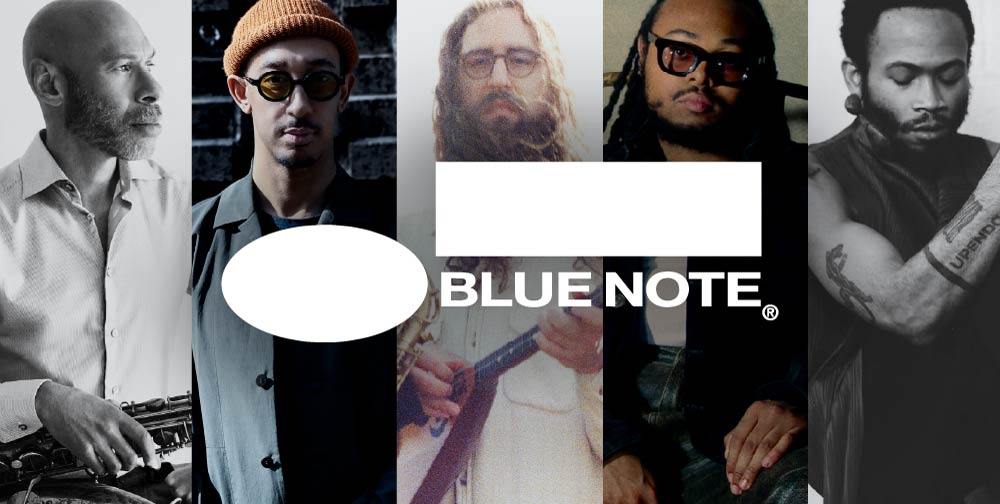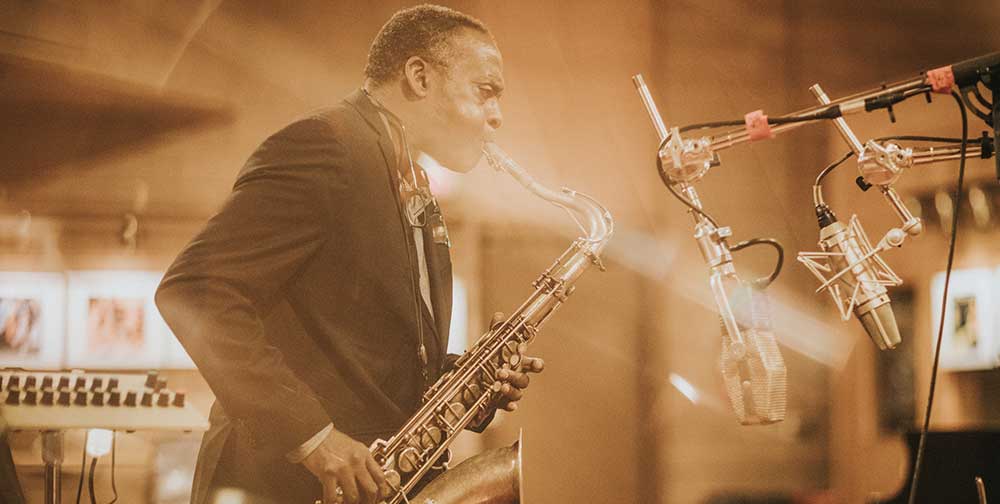About signing to Blue Note
I’ve been on these big labels where jazz is a tertiary consideration, and it’s fine. I mean, the catalogs were great, and they were supported to the extent that they could be. But the reality is that very large companies, these guys keep their jobs by selling lots of records, and jazz has never been a kind of music that sells a lot of records. So they tried to help but they were limited in what they could do.
But in Blue Note, jazz is kind of the core. All the Wayne Shorter records, “Juju”, “Night Dreamer”, “The All Seeing Eye” and “Schizophrenia”, all these great records. Art Blakey and the Jazz Messengers “Moanin” was on Blue Note. Horace Silver’s “Song for my Father” was on Blue Note. I could keep going. “Capuchin Swing” was a Jackie McLean record – great record. Sonny Rollins was on Blue. It’s everybody. And they’re turning it over again with these young guys. They’re signing.

Branford Marsalis Quartet Belonging
Available to purchase from our US store.About getting into Keith Jarrett’s music
Unlike the majority of people, when I heard the “Köln Concert” as a kid, I was not blown away. It just didn’t move me. And I made the stupid decision to make that one record be the metaphor for everything that Keith ever wrote and said, “Oh, you know, I didn’t like that first record, so I’m clearly not going to like the rest of them.”
And then my dear friend Kenny Kirkland put his headphones on my ears on a plane ride, and it was “My Song”, and when I heard the record, after about five minutes, he tried to take the headphones back, and I wouldn’t let him have them. And when the plane landed, I said, “We’re going to the record store”, and I bought every Keith Jarrett record I could find in the store.
About Jarrett’s European quartet on “Belonging”
I don’t think it had anything to do with them being European. The American quartet, as they call it, their core experience in playing music is the swing music of the 1930s and the 1940s big bands. There’s a reason why jazz musicians play the same songs, as all of these Broadway songs and the way that they structure the songs lend themselves to the way they play. Keith was writing songs that did not have that structure, and those guys struggled to play those songs, and he needed to find musicians who had the certain kind of harmonic expansiveness that he needed to interpret his music.
And he also needed people who were young enough that they would do what he wanted them to do. Because playing with those veterans, they were kind of like, “Shut up kid”, you know, “we’ll take care of this.” And you can hear it on a lot of the records – what they’re playing is certainly not what he would have wanted them to play sooner. I’ve never met Jan, so I don’t know, but I’m just going to go out on a limb and say that when Jan was seven years old, his first concert wasn’t James Brown, followed by Susan Crofts and then Earth, Wind and Fire.
About the dominance of vocal music today
It is very difficult to get audiences to enjoy music that doesn’t have lyrics attached to them. Where they can relate to the music is if the music makes them feel a certain way, but the approach that a lot of modern musicians have is like, they only kind of listen to their own music, and most of that music is not melodic. It is based on harmonic information, and there’s no emotion attached to it. So if you want to play for audiences bigger than a club where you’re playing for fellow musicians, you’re going to have to make an adaptation. You’re going to have to modify this thinking, and the way to do it is to listen to music that is perpetually happy. It’s not like I’m saying start a 30s band, but I listen to 30s music. I’ve been listening to it for years.
About getting to know jazz in his early 20s
I was an R&B kid. I was a big Led Zeppelin guy, too. I used to listen to Zeppelin and Hendrix and Bob Marley and all of these things. I didn’t really pay attention to jazz until I turned 19 or 20, when I heard and saw my brother playing with Art Blakey. And then my roommate, Marvin “Smitty” Smith, this fantastic drummer, he owned those early Miles Davis records with Herbie Hancock and Wayne Shorter on them. I’d never heard those records before, because in my mind, Herbie Hancock had a band called Headhunters, and Wayne Shorter was in a band called Weather Report. I didn’t know they played with Miles. When I heard those records, I was like, wow. Now I would like to play that kind of jams.
About an early lesson from Art Blakey
I don’t like tampering with people’s music. Art Blakey very cruelly disabused me of that notion when I was a young man. He wanted me to play a ballad because I was a terrible ballad player, so I started changing all the chords to a Gershwin song to fit what I could play. And he let me have it. He says, “What the hell do you think you’re doing?” And I was defensive. I was a stupid kid. I said, “I’m just trying to make this hip.” And he says, “What do you know about George Gershwin? You know he wrote oratorios? You know he wrote an opera? Do you know he wrote some of the most important pop songs in the 1930s?” I said, “What’s the point?” “The point is he doesn’t need your sorry ass to make him hip. He’s already here. You’re the one who sucks. What makes you think you have the skill and talent to change this man’s music? Play the song as is.” I was furious, but five years later, I was very grateful.

Branford Marsalis Quartet Belonging
Available to purchase from our US store.Jane Cornwell is an Australian-born, London-based writer on arts, travel and music for publications and platforms in the UK and Australia, including Songlines and Jazzwise. She’s the former jazz critic of the London Evening Standard.
Header image: Branford Marsalis. Photo: Peter Van Breukelen/Redferns.




